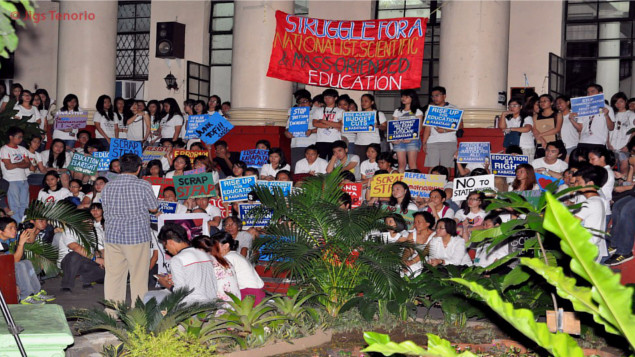SUMMARY
This is AI generated summarization, which may have errors. For context, always refer to the full article.

MANILA, Philippines – Yielding to public clamor and indignation, University of the Philippines president Alfredo Pascual lifted the university’s “no late payment policy” widely criticized after a UP Manila student killed herself reportedly over failure to pay tuition on time.
In a memorandum issued by Pascual, he said that “the no late payment policy has been lifted. Any student with financial constraints will no longer have any problems with regard to tuition fee payment deadlines.”
Addressing all chancellors in all units of the state university, Pascual said, “In view of the issues raised regarding the late payment of tuition and other school fees, henceforth, I am enjoining all chancellors to allow a reasonable amount of time for registration and payment of fees.”
This announcement came days after 16-year-old Kristel Tejada committed suicide reportedly over her family’s failure to meet deadlines for tuition payments.
Archaic and inflexible
The UP administration also admitted that the UP Code which was the basis of the “no late payment policy” is archaic and inflexible.
UP Vice President for Public Affairs Prospero de Vera admitted that the 38-year-old policies need to be studied and updated to adapt with the changing times.
“The policy is very strict, the way it is written in the code,” De Vera said.
On March 18, Tuesday, UP Manila Chancellor Manuel Agulto ordered the suspension of the “no late payment” policy in UP Manila.
De Vera said the suspension of the policy was decided to “give the chancellors a chance and the responsibility to craft campus-specific policies that will address the problem of registrations and late fees that have come up recently.”
UP Manila is the only UP campus that strictly implements a “no late payment policy.” This is in accordance with Article 330 of the 1975 UP Code that stipulates “no student who has not duly matriculated shall be admitted to classes.”
Still not guilty
However, De Vera clarified that the suspension of the policy is not a result or an admission of culpability for Kristels’ suicide.
The package of reforms that are currently underway, according to De Vera, had been planned and drafted since UP President Alfredo Pascual assumed office.
“It’s unfortunate that the tragic and untimely death of Kristel focused attention on the UP policies,” De Vera said.
To some extent, De Vera admitted that the suicide incident may have been providential in terms of pushing the need to reform policies.
Problems of the UP code
De Vera acknowledged that the UP Code has become archaic over time. Since its passing and implementation in 1975, the UP Code has never been revised.
With the lifting of the “no late payment policy,” the UP administration is giving the chancellors of each UP unit flexibility to craft campus-specific policies.
The problem with the UP Code, according to De Vera, is that it is a “one-size-fits-all” policy that covers all UP campuses, irrespective of conditions.
Package of reforms
Waiting approval by the Board of Regents in their upcoming meeting on April 16 are proposals for reforms directed at increasing support for poor, but deserving students.
Pascual is expected to submit for review by the Board the Socialized Tuition and Financial Assistance Program (STFAP) and other proposed reforms. The specific recommendation of the UP president includes simplifying the process of application, changing the bracketing system, streamlining the procedure for reconsideration, and increasing the stipend for students in the lowest STFAP bracket.
De Vera also noted that one of the problems encountered by students is the bulk of overall assessed fees that they need to pay upon enrollment and registration. This is why the UP administration is introducing a recommendation for a system of payment by installment.
Besides these, the UP administration is also planning to raise daily compensation for student assistants and research assistants to minimum wage levels. The current salary for student assistants amounts to P30 per hour as compared to the minimum wage of P456. – Rappler.com
Add a comment
How does this make you feel?
There are no comments yet. Add your comment to start the conversation.